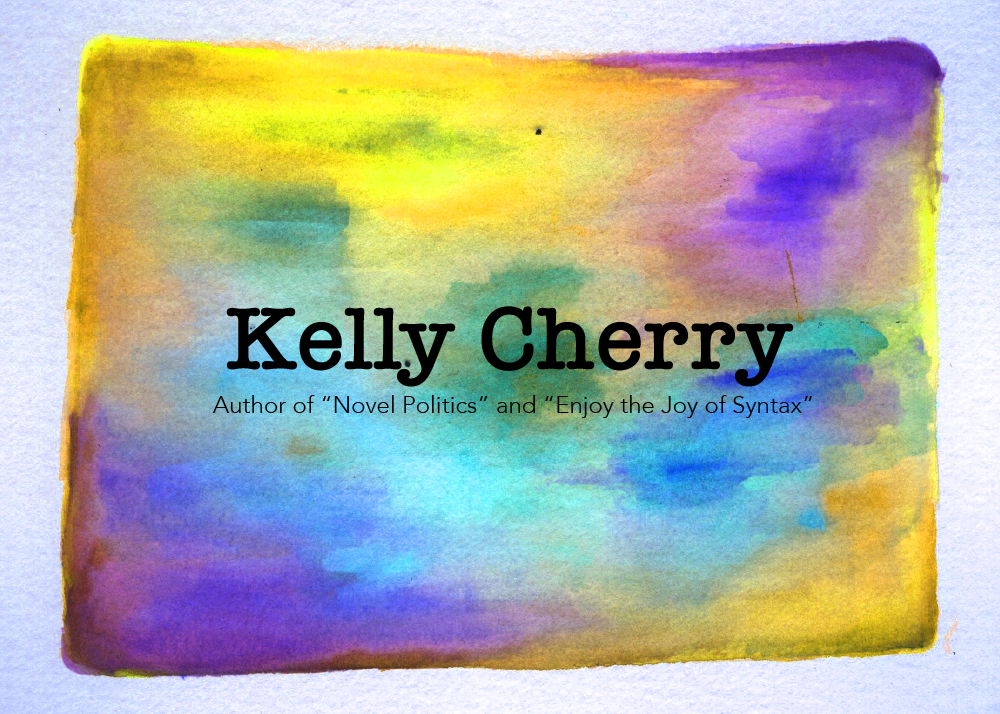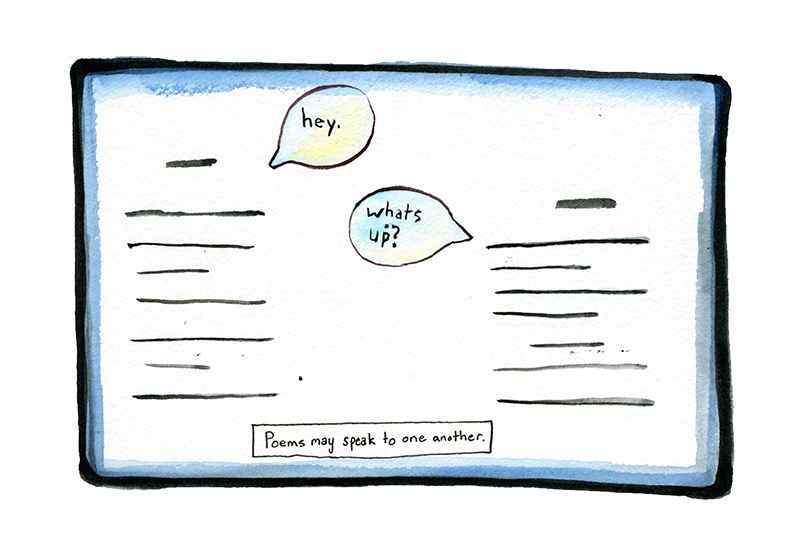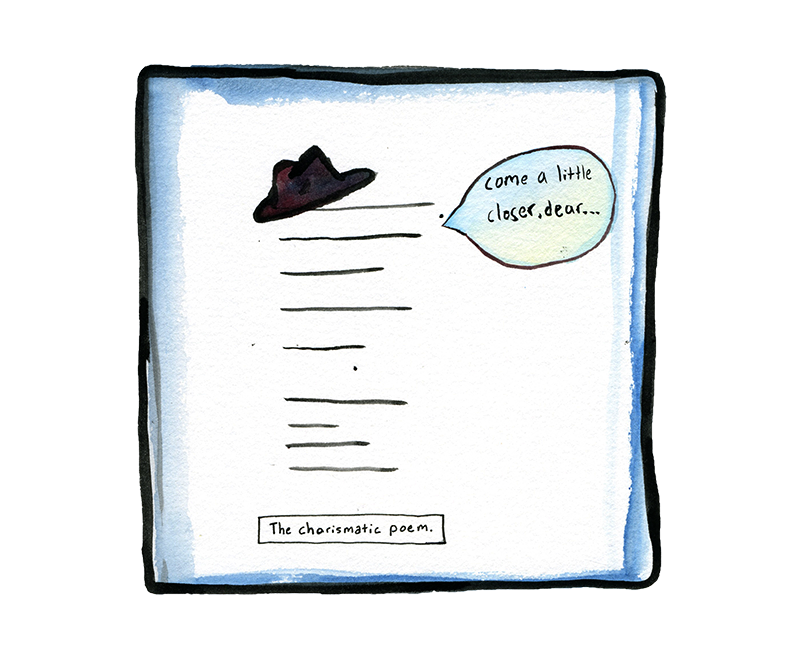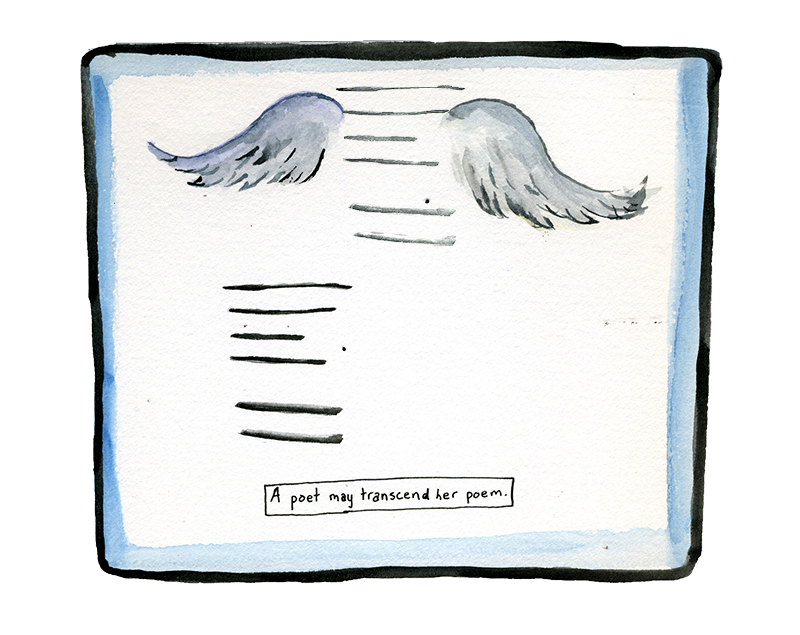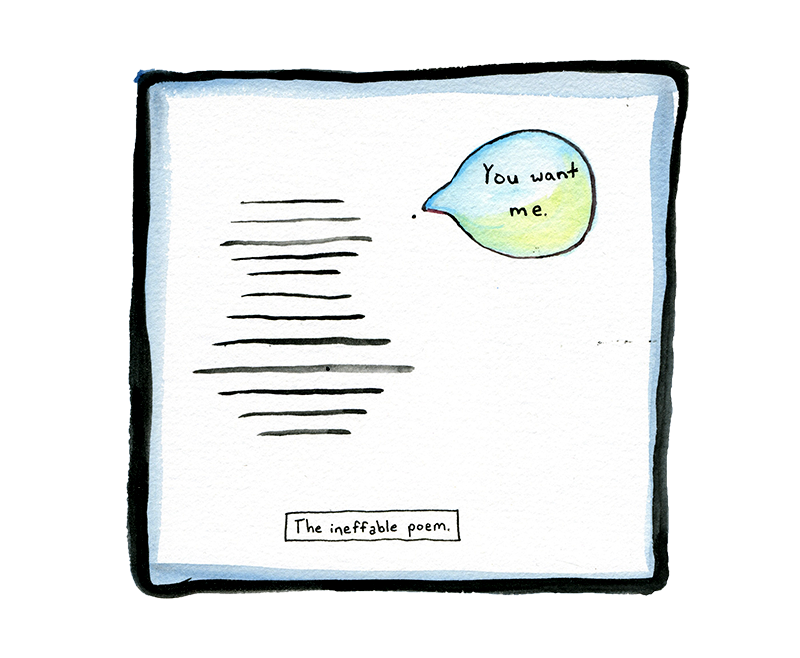Just as the novel has an affinity for the political but is not required to encompass the political, the poem has an affinity for philosophy but is not required to appeal to or include the philosophical. The writer has choices.
In fact, you are free to ignore me on the subject of the poetical/philosophical. One of the strongest passages to writing a good — or, as Harold Bloom likes to say, strong — poem is to name objects. Naming is not exactly the same as description: I’m speaking of solid names for solid things. Read Seamus Heaney, especially his famous poem “Digging,” and you will see how this works, how it plugs us into reality and astounds us as we make that connection with wood, water, fire, and air. We believe we are aware of the world but, stand on it though we do, we find ourselves separated from it and wanting to draw closer. This is why explorers head off for far parts, or climb Mount Everest, or search the sea for previously unseen underwater phenomena. It’s not simply curiosity, although curiosity is a mighty mobilizer, urging us to learn as much as possible. There is another component, and it is love. We love our planet (well, Donald Trump doesn’t, but most of us do). We have a planet that offers us a lot of what we need, and most of us know it is urgent that we save our planet from influence that corrodes the careful conservations scientists have sought to keep in place.
Yet poetry, despite its often measured meter and set directions, may be the freest of forms. Poems may be domestic. They may take on a state or the world. They may be funny. They may despair. They may be romantic or witty. They may be lineated, or mimic flying birds, the words displayed in a visual shape such as wings or circles. The poem may be redacted to highlight what is missing from the poem or what is significant in the poem. The poem has punctuation, or then again, it does not. The lines’ initial letters may be capitals, or they may not. The poem may be spoken. The poem may be read silently. The poem may be revised endlessly. Poems may speak to one another, as many poets incorporate in a poem a line or an image of someone else’s well-known poem. (Well-known, because you don’t want to plagiarize!) A poem can be dark. It can be light. It can be an ordinary day or an apocalypse. It can be a book, a chapbook, or a poem in a book. It can be beautiful, cynical, generous, mean, serious, mocking, cheerful, sad, celebratory, elegiac, jokey, grieving. It is related to mystery.
How so?
Every poem is in search of something. A description, an image, a conclusion, a strong line. These things turn up as you write. (If they don’t turn up, you shouldn’t write poetry.) The tiny details of rhyme, rhythm, diction, point of view, alliteration, consonance, punctuation, and wordplay are essential. Syntax is crucial. The poem’s essence lies in the sounds and pictures that you put on the page, and as you write, the poem or page will carry you to unexpected places. That’s the excitement that the poet experiences. It’s something like sleuthing, but what you are sleuthing is to be found in your own mind. Way back in “The Shortest Distance between Two Points Is a Metaphor,” I spoke of poems that have charisma. A charismatic person is one who withholds some of his or her words. I imagine this most often happens accidentally, but if you look around you and can point (but don’t really point; it’s rude) to someone who fascinates you, that person is probably saying something that interests you but is not the whole story. It’s the not-having-the-whole-story that intrigues you and makes you hang on your friend’s words and hope for the next word. I don’t know if charismatic people always do this, but I know that some charismatic people do it. Do they do it intentionally? Probably some do and some don’t. But we are not going to talk about people here. We are going to talk about poems. Especially the charismatic poem.
The charismatic poem is an idea I have made up. Imagine a poem that is both forthright and withholding. That is, it has something to tell us and something it doesn’t want to tell us.
Why write a poem that refuses to tell us the whole story? Actually, it’s not that unusual.
Look at this charming poem by Emily Dickinson:
A Bird came down the Walk –
He did not know I saw –
He bit an Angle Worm in halves
And ate the fellow, raw,And then, he drank a Dew
From a convenient Grass –
And then hopped sidewise to the Wall
To let a Beetle pass –He glanced with rapid eyes
That hurried all abroad –
They looked like frightened Beads, I thought,
He stirred his Velvet Head. –Like one in danger, Cautious,
I offered him a Crumb,
And he unrolled his feathers,
And rowed him softer Home –Than Oars divide the Ocean,
Too silver for a seam,
Or Butterflies, off Banks of Noon,
Leap, plashless as they swim.
There is humor here (“ate the fellow, raw”), simple statements (e.g., drank, hopped sidewise, eyes like “frightened Beads”), and a happy ending (“rowed him softer Home”). The poem could easily have ended after the fourth stanza. Yet Dickinson moves on to a fifth, and the fifth is puzzling. Apparently the bird’s transition to “Home” is softer or more gentle than a boat in the ocean whose silvery, watery trail quickly reverts to a smooth ocean. Even butterflies, taking off from the banks of the ocean, “swim” in air. How exactly do butterflies do that? Do they do that? Or is Dickinson, in the last verse, entering a fugue of sorts? Or creating a fugue? A poet may want to transcend her own poem. Something in her may want to soar, like the bird, like the butterflies.
In fact, I’m sure something in her wants to soar. It’s rare to find a poet who doesn’t want to soar, in imagination or rhetoric (by which I mean the diction and music, both) or an image.
Who would not want to soar? Well, maybe we don’t want to soar in real life, but soaring in a poem is exciting, freeing, mind-opening (not mind-blowing; mind-opening). In that existential state, poets attempt to delineate what cannot be delineated. They want to delineate life, the very fact of being alive. Of course, each poet has a different sense of life, of living. One poet may celebrate life; another intends to point out all that’s wrong with it. One poet equates life with nature; another, with a city life, writes poems about trucks, buses, traffic jams. One poet loves conversations and writes her friends into her book; another wants no conversation, wants to be alone in the world to write about solitude or a single subject that he considers his own. And then there are poets who write about everything; they are probably the majority of poets.
So how can we find what we are looking for?
We can’t. The ineffable, which is what we are looking for, cannot, by definition, be found. The search is like a search to find and hold air in your hand. It can’t be done. Or if it can be done, you cannot show it to anyone else. You can’t even see it yourself.
It is something that . . . something which . . . something like . . . okay, something like smoke without fire, without a match, without a cigarette. We are trying to describe something that can be described only by saying what it is not. The idea of God has sometimes been described by negatives: God is incorporeal; i.e., He has no body. God has no gender, despite the masculine pronoun. This latter sentence might suggest to us that we are NOT made in God’s image, but religions will always find a way to say we are. Does God exist? Yes, no, or maybe, depending on whom you ask.
The point here is that God is ineffable. Yes, if you are Paul on the way to Damascus, you may encounter Him, but you are not that Paul and will not see Jesus on the road. In fact, Paul did not see Jesus; he claimed he had visions of Jesus, which are quite something other than actually seeing. Was he psychotic?
I am not, you understand, discussing theology. I am simply pointing out that the ineffable cannot change itself to the effable. The philosopher Ludwig Wittgenstein advised us that “[w]hereof one cannot speak, thereof one must be silent.” This may at first be read as a caution not to say anything about something you’re not expert at explaining or expatiating upon but it also suggests that there is something we cannot speak. If so, whatever that is is, it is ineffable.
You need not look far to find — no, I should say feel — something ineffable. Have you heard music that made you want to capture it, perhaps in your writing? Have you seen a work of art by Cézanne or van Gogh or Rothko that sent you into a head spin or left a hole in your heart that you wanted to fill with a painting as strong as that? Have you read a novel or a short story or a poem that made you breathless at the end, breathless and amazed and unsure what you should do after that?
T. S. Eliot produced a poem titled “The Naming of Cats,” which suggests that every cat in a household has, in fact, two names in addition to the name by which his family calls him. One must be singular, a name different from all the other names of cats. The second name is absolutely not to be known by any other cat (although how it might be known could be interesting). Only the cat knows his second name, which is to say, the second name is ineffable. Eliot had fun with this word, mixing it up with words like “inscrutable” and “effable.” You might want to read the poem.
If God is ineffable, his name is also said to be ineffable. That is why Moses asked God how He wanted to be called. God’s answer was “I am that I am.” Of course, we could all say that is our name too, but when God says it, we think it mysterious and yet informative; we might say the name is existential and he is too.
Feelings are often called ineffable. So are experiences difficult to convey to anyone else. The horrors of war may be called ineffable, even though they seem to me altogether much too evident. Souls are ineffable. Some say the meaning of life is ineffable. Is it? You probably have some notion of the meaning of your life, but the abstracted meaning of life is more difficult to specify.
Thomas Aquinas said what we should aim for in life is to be joined with God and enjoy an eternal fellowship with him. If we have been saved by Christ, we shall, after death, receive a beatific vision that blesses us with eternal happiness. Happiness with God, to be precise.
Aquinas was a wonderfully logical theologian, but he began with premises we may not agree with. His ineffable may not be our ineffable.
The ineffable is what we cannot say. It is that for which we have no language, or only language that falls short. But the ineffable is what many serious writers, and surely every poet, or almost every poet, wants to write. One approach to the ineffable is to mimic reality, allowing readers to see, hear, touch, smell, and taste a world, large or small, through the author’s words. Fiction writers, poets, and essayists may do this. But the arsenal of poetry — metaphor, image, rhyme, meter, diction, point of view, alliteration, consonance, punctuation, forms aplenty, and wordplay — make the poet most likely to get closest to the ineffable. When the poet succeeds, or even if the poet only half succeeds, the poem acquires charisma and stays with the reader for a shorter or longer — perhaps lifelong — time. Whatever you want to write may begin as simply as a note on a piano or a chord on a guitar. It may begin as simply as a sketch on a piece of paper. Yes, such simple moves can lead to ambitions bound to fail. Don’t worry. Your failures will rivet your readers and they will understand that behind or around or in those words are a mystery beyond any confession or hope, a mystery that is, of course, forever ineffable. •
All images created by Emily Anderson.
